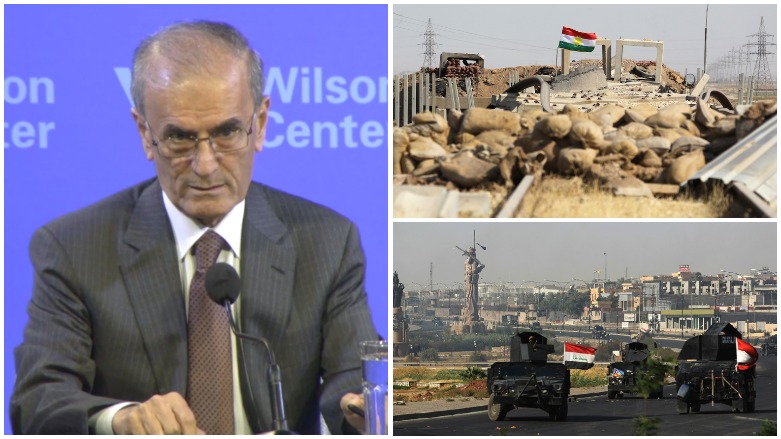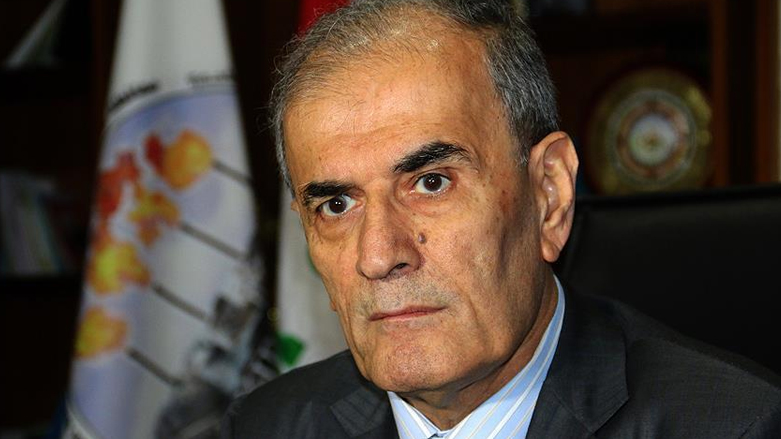Former Governor Najmaldin Karim: Justice needs to be restored in Kirkuk

ERBIL (Kurdistan 24) – The former Governor of Kirkuk, Najmaldin Karim, discussed on Tuesday the Kurdistan Region’s independence referendum as well as relations between Erbil and Baghdad during a conference hosted by the Woodrow Wilson Center in Washington DC.
The event, titled “The Future of Iraq: A Conversation with the Former Governor of Kirkuk,” explored why the Kurdistan referendum failed, what role Turkey and Iran played in these developments, as well as the Kurdistan Regional Government’s (KRG) future in Iraq.
Kirkuk and the Kurdistan referendum
Karim recalled the situation in Kirkuk while he was Governor and said the province only had one brigade of Peshmerga alone but was able to defend Kirkuk and repel the threat of the Islamic State (IS) at a time when the group was at its strongest attacking other parts of Iraq.
He pointed out that hundreds of thousands of displaced persons (approximately 700,000) came to Kirkuk for protection.
“The oilfields, which were the major prize for IS, were protected by the Peshmerga forces,” Karim stated. “We gave a high price. A lot of our Peshmerga forces were [martyred] protecting Kirkuk.”
The former governor also reminded that the Kurdistan referendum was held after violations of the Iraqi Constitution, especially matters related to Article 140 and other disputed between Erbil and Baghdad.
He said the former Kurdistan Region President Masoud Barzani and himself had “made it clear that the referendum does not draw the borders of Kurdistan.”
“This referendum [was held] not to declare Kurdistan’s independence right away, but to get into negotiations about the issues that led us to this referendum,” he explained.
Developments after the referendum
Regarding the Oct. 16 military attack on Kirkuk against Peshmerga forces by the Iraqi army and Iran-backed militias, Karim said foreign interference from Iran and Turkey led to the fall of the province and as a result, a resurgence of IS in areas of Kirkuk, including Hawija.
“Foreign interference in the internal affairs, particularly from Iraq’s eastern neighbor and northern neighbor led to what happened on Oct. 16,” he said. “Since then, over 200,000 people have been displaced from Kirkuk. Kirkuk is nothing like it was before.”
He also warned that IS was “very active in the areas which were supposed to be controlled by Iraqi security forces.”
“A day doesn’t go by where there isn’t an attack on civilians and security forces in Hawija and around Kirkuk itself,” Karim added.
Tragedy in Afrin
Karim said the United States, who have backed the Syrian Kurdish forces in the ongoing fight against IS, had abandoned them at a crucial time which led to the tragedy in Afrin.
“What we saw happen in Afrin was really a tragedy and a let down by the US as far as the Kurds are concerned,” he said, describing the former Kurdish-held enclave as “the most quiet, co-existing city” in the country.
“The Kurds of Syria have been the only fighting force that was able to fight IS and expel them from significant areas, including all of northeast Syria,” Karim noted.
The Kurdish forces were “a very disciplined force. Men and women were fighting.” During the US Presidential debate, Kurds were described as the most effective force, he added.
The former governor also suggested Russia had allowed Turkey to use Afrin’s airspace as revenge against the Kurds for their alliance with the US-led coalition.
“Russia, I think, took revenge on the Kurds because they were so close to the Americans—doing ‘American bids’ as they claimed. They allowed their forces to withdraw from [Afrin],” Karim said.

